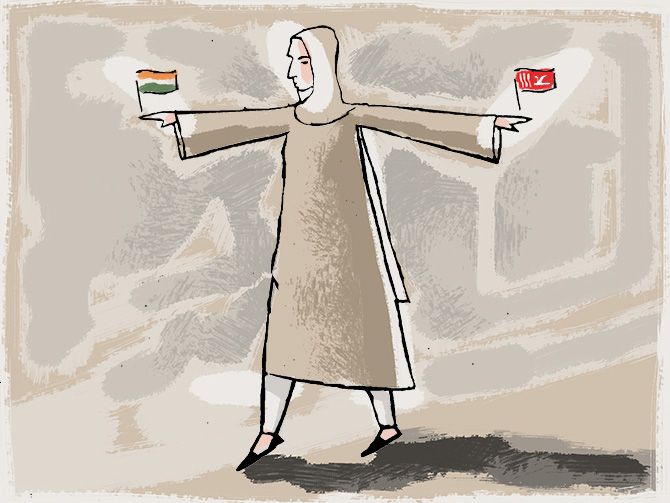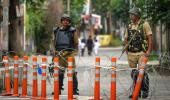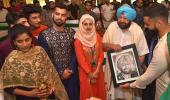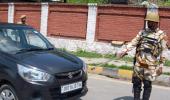'The Article 370 decision has served the minorities of Jammu and Kashmir whose reaction is in stark contrast to that of the state's majority, the Kashmiri Muslims, who feel betrayed by the decision of the Government of India,' points out Preksha Sharma.
Illustration: Dominic Xavier/Rediff.com

The state of Jammu and Kashmir (J&K), as we have known it, consisted of three contiguous regions with distinct cultures, languages, ideologies and religions, put together by a trade treaty and military conquest by Dogra ruler, Maharaja Gulab Singh.
On August 5, the Union government of India reshaped the state's boundaries, slicing it into two Union territories, one with a legislature and the promise of becoming a state some day, and the other without a legislature but with a hope of getting one, perhaps on another day.
This is the fate of the land that was tied to the Indian nation and Constitution through Articles 370 and 35A.
Tied with a slender thread, arguably, one that gave Jammu and Kashmir "special status".
All these years, a precious document titled "State Subject" separated us from the rest of India.
The one that carries my name, along with impressions of my fingers at babyhood, was evidence of my love affair with a conflict over land and identity.
A mere affair, because I could marry an "Indian" and lose it all.
Thus, it was unsettling that though I have family in Jammu and friends in Ladakh and in Kashmir, I received the news that affects all of South Asia through a tweet by former chief minister Mehbooba Mufti.
The state was put under a communication lockdown, our loved ones unreachable.
I was not particularly worried, unlike my Kashmiri friends.
Jammu and Ladakh have always been relatively safe.
As the government spelled out its plans for the state, these regions, home to two main religious minorities, burst into celebrations.
In Ladakh, communication snapped back by August 6, and I had many friends to congratulate.
Over the last few years, I had spent several evenings in the Trans-Himalayas listening to them outline their dream of seeing Ladakh become a Union territory, never really believing that it would ever happen.
Phone networks sprang alive in Jammu on the same day, too.
Almost immediately I received a call from my grandmother.
The governmental diktat led her to declare that she would now leave her house in Old Jammu to her four granddaughters.
(If a woman married a non-permanent resident of the state, Article 35A did not allow her children succession rights to her property.)
The internet was restored soon too, and messages from relatives, who lived with the tag of "West Pakistani refugee", poured in.
They, too, were deemed subjects of the territory now.
But the Kashmir Valley and regions of Rajouri and Poonch in Jammu continue to remain incommunicado, leaving the majority community of the state, Kashmiri Muslims, voiceless while their fates are being decided.
A friend who managed to reach Jammu messaged to say she could see my missed calls.
Though I never heard the phone ring, I have been obsessively calling my friends.
What else does one do?
The former state of Jammu and Kashmir is a hyper-complex matrix.
It's not possible, as Karan Singh, Congress leader and J&K's last ruler Hari Singh's son, states, to have a "blanket condemnation of these developments".
The decision that has been criticised for being unconstitutional has served the minorities of the state, of which I too am part.
Or so it would seem.
The minorities' reaction is in stark contrast to that of the state's majority, the Kashmiri Muslims, who feel betrayed by the decision of the Government of India.
It all happened unusually fast.
Some 35,000 soldiers fanned out across Jammu and Kashmir, all communication was cut off, curfew imposed, and an Article in the Constitution that granted the state special status and partial autonomy revoked.
It took a day.
The Kashmir Valley has since been buried under a blanket of silence.
"We always saw Articles 370 and 35A as a flimsy string that connected us to the Indian Constitution.
"Even though we considered ourselves occupied, it gave us hope that one day our issues might be solved.
"By complete abrogation of these Articles, the people of Kashmir are alienated further," says Muzzamil Ayyub Thakur, London-based executive director of The Justice Foundation-Kashmir Institute of International Affairs, a "non-partisan NGO that seeks justice and peace for the oppressed people of J&K".
My Kashmir-based friends remained unreachable at the time of writing this article.
The long struggle of the Kashmiri people has been for their identity, to wrest back the right to decide their fate, and to realise the dream of wielding autonomy over their lives and land.
"We have feared this for a very long time. When we are promised development, it has not been lost on Kashmiris that the true agenda is to create a situation which leads to settler colonialism and change the demographics of Kashmir," says Mohamad Junaid, a cultural anthropologist at the Massachusetts College of Liberal Arts, in Massachusetts, USA.
The government's step strikes at the heart of the Kashmiri ideological struggle: that Kashmir belongs to Kashmiris.
These decisions received overwhelming support in Parliament.
Soon after, the Supreme Court refused to accord an urgent hearing to a plea challenging the Presidential Order on Article 370.
The house arrests of political leaders who have supported or worked with Indian governments in the past are being seen as a breach of trust on the part of the Indian State.
"Everyone is laughing at the PDP (Peoples Democratic Party) and NC (National Conference). Their leaders were completely Indian, at least by conviction, and now they have been alienated.
"Everyone is saying, 'This is exactly what you people deserve. This is what you did to us, and now India is doing that to you'," says Thakur.
Resentment against the Indian State is building in the Valley.
The urgent nature of the lockdown and curfew didn't give people the time to store enough supplies, and reports of families running out of food have started trickling in.
The Indian government will have to face the people sooner rather than later.
"There is a lot of fear and anxiety. I have been asking people what we should do about it. And they are saying that it is now or never. Their everything is at stake. What is the option for us now? You cannot expect us to live as second-grade citizens in our own homeland," asserts Junaid.
In the state of Jammu and Kashmir, Ladakh accounted for 52 per cent of the surface area -- a surreal, moon-like landscape inhabited by 2 per cent of the state's population that elected four MLAs to a house of 87.
This cold desert is extremely hostile to human survival, but political ambitions have thrived here for long.
Ladakh politician Azang Samphel, 71, says that his life's purpose has been served.
From 1998 to 2004, he claims to have staged 85 public demonstrations demanding Union territory status for Ladakh.
In 2014, he lost the election to the contender from the Bharatiya Janata Party, the only political party that promised UT status and removal of Article 370.
Samphel, a Congress party member, doesn't regret that loss if it led to getting UT status for Ladakh.
"Now we have our representation, and our identity. We don't have to live with the discrimination."
Residents of Leh city and surrounding areas were ecstatic to find that they have, quite suddenly, become a Union territory.
Rinchen Angmo Chumikchan, editor of Reach Ladakh Bulletin, a local fortnightly, views the current developments in Ladakh with the caution and slight scepticism characteristic of an editor.
"We never expected that overnight, in the blink of an eye, we will get UT status," she says.
Safeguarding the land and culture from mainlanders is a looming concern.
"We have become a UT but we don't have a legislature. So, we have to wait and see what that means for us."
Like most things in the erstwhile state of Jammu and Kashmir, the demand for UT status has multiple dimensions.
Political and religious organisations of Kargil district in Ladakh have unified to vehemently oppose the decision by staging protest rallies and calling for a complete shutdown.
Since its inception, the UT struggle had acquired a "Ladakhi" and "Buddhist" identity, centred in Leh.
Ladakh's second largest town, Kargil, and its Muslim majority leaders, felt excluded, but also failed to unite into a movement.
Their internal politics remained divided.
Zangzkar, a sub-district in Kargil with 95 per cent Buddhist population, came all out in support of UT.
An invisible implication of this move was the perception that Buddhists represented Ladakh.
In fact Ladakh was a Muslim majority region, and remains so.
The news made Jammu erupt in celebrations.
Residents of Jammu city poured out on to the streets notwithstanding the imposed Section 144.
These were unseen, unreported festivities, especially in the congested lanes of Old Jammu where people danced and distributed sweets.
From a state, Jammu and Kashmir had been reduced to a union territory.
Yet, the Hindus, who constitute the largest minority in the state, were jubilant and see this move as freedom from decades-old Kashmiri (Muslim) dominance.
Last year, events following the infamous Kathua rape case exposed the festering wounds and deep fissures between the regions on Jammu and Kashmir.
The Hindus of Jammu, most of whom identify ethnically as Dogras, accused the Kashmir-centric government of regional discrimination, inadequate representation and institutional neglect.
There were protests against systematic "demographic changes" in Jammu by illegal encroachment of forest and government land.
A widespread belief was that not only was the government looking the other way, it was also facilitating land frauds to disempower the Hindus of Jammu.
Manu Khajuria, London-based founder of Voice of Dogras, an organisation working for the preservation of Dogra culture, sees this move by the Centre as "a chance to reverse the 70-year-long oppression and regional discrimination that Dogras faced because of skewed and unfair representation in the legislative assembly".
The freshly minted UT is now anxiously awaiting delimitation that will redefine the political map of the region.
Even Karan Singh, former governor and MP, issued a statement that stated: "There will be fresh delimitation which, for the first time, will ensure a fair division of political power between the Jammu and Kashmir regions."
A couple of years ago I heard Singh talk about the"power imbalance" between the two regions.
Jammu had vanished from the vocabulary of media and politicians.
All one heard was talk of the "Kashmir problem", the state of "Kashmir" or "Kashmiris".
I have personal experience of this: most of my friends in mainland India still refer to me as Kashmiri.
There are other voices from the community, too, who are demanding that Jammu be a separate state.
A pragmatic journalist from Jammu, who declined to be named, feels, "We should be worried about being downgraded to a UT.
"State jobs are gone.
"Students preparing for state administration and exams are distressed."
He adds that celebrations in Jammu are premature.
Some local ministers placed under house arrests had called for rallies to demand complete statehood.
Khajuria acknowledges these demands but also observes that for India, it is not easy to isolate Kashmir.
"It's a burden we have to carry for geo-strategic reasons," she says.
Judging by the early reactions from the Valley, she anticipates troubles in Kashmir very soon.
She says, "We hope they follow the democratic process of our country now. In any case, we have to focus on developing our Jammu region, unka hum kya bolein (what can we say about them)?"












 © 2025
© 2025